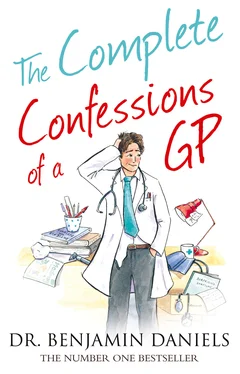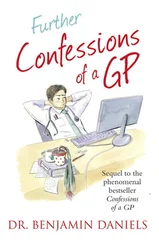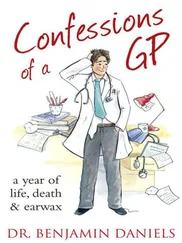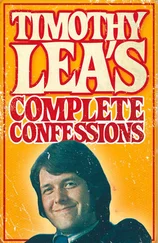Benjamin Daniels - The Complete Confessions of a GP
Здесь есть возможность читать онлайн «Benjamin Daniels - The Complete Confessions of a GP» — ознакомительный отрывок электронной книги совершенно бесплатно, а после прочтения отрывка купить полную версию. В некоторых случаях можно слушать аудио, скачать через торрент в формате fb2 и присутствует краткое содержание. Жанр: unrecognised, на английском языке. Описание произведения, (предисловие) а так же отзывы посетителей доступны на портале библиотеки ЛибКат.
- Название:The Complete Confessions of a GP
- Автор:
- Жанр:
- Год:неизвестен
- ISBN:нет данных
- Рейтинг книги:3 / 5. Голосов: 1
-
Избранное:Добавить в избранное
- Отзывы:
-
Ваша оценка:
- 60
- 1
- 2
- 3
- 4
- 5
The Complete Confessions of a GP: краткое содержание, описание и аннотация
Предлагаем к чтению аннотацию, описание, краткое содержание или предисловие (зависит от того, что написал сам автор книги «The Complete Confessions of a GP»). Если вы не нашли необходимую информацию о книге — напишите в комментариях, мы постараемся отыскать её.
The Complete Confessions of a GP — читать онлайн ознакомительный отрывок
Ниже представлен текст книги, разбитый по страницам. Система сохранения места последней прочитанной страницы, позволяет с удобством читать онлайн бесплатно книгу «The Complete Confessions of a GP», без необходимости каждый раз заново искать на чём Вы остановились. Поставьте закладку, и сможете в любой момент перейти на страницу, на которой закончили чтение.
Интервал:
Закладка:
Janine’s mum looks me straight in the eye. Her face looks like a pitbull slowly chewing a wasp. ‘It’s got nothing to do with her weight,’ she says angrily. ‘Janine’s cousin is as skinny as a rake and she has problems with her ankles, too. It’s hereditary.’
What can I say to that? My courageous leap got me nowhere. I belly-flopped painfully. Can I prove that Janine’s ankles hurt because she is fat? No. Is Janine’s mum going to accept that weight is an issue? No. I either argue on fruitlessly or accept that I am beaten and salvage the few scraps of the patient–doctor relationship that are still intact.
‘She can still do swimming!’ I shout as they waddle away, sick note and paracetamol prescription already tucked snugly into Mum’s handbag. It is a final attempt to redeem myself, but a poor one. I can picture Janine sitting in the changing rooms munching on some crisps while the rest of her class runs around outside. Beneath the many layers of abdominal fat, her pancreas would be slowly preparing itself for a lifetime of insulin resistance and the debilitating symptoms of diabetes that occur as a result. Meanwhile, her joints, straining under her weight, would be struggling to cope and the resulting damage would eventually develop into early onset arthritis.
Did I miss my chance to make a difference? Have I been a shit GP again? Are doctors slightly egotistical even to consider that a few well-placed words of advice from us can breach deeply entrenched lifestyle and dietary habits? ‘Hold on, kids, no more sugary drinks and turkey twizzlers for us. Dr Daniels thinks we are overweight and thank goodness he pointed it out or we would never have noticed. He’s given me a wonderful recipe for an organic celery and sunflower seed bake and we’re swimming the Channel at the weekend.’
Saving lives
A few years back I spent a stint working in a hospital in Mozambique. Each morning the American consultant would start the ward round with a prayer and then shout boldly and, with not the slightest hint of irony, ‘Come on team, let’s go save some lives!’ The rest of us would then cringe internally, roll our eyes at each other and then follow him round the morning’s array of sick and dying Africans. There are a surprising number of Western doctors filing around the wards of African hospitals. I’m not always sure of the motives but there we were: an American cardiologist, two British GPs and a French nurse. Between us, we had years of expensive medical training and lots of letters after our names. As we wandered through the wards, we didn’t really save many lives. The majority of our patients were dying of AIDS-related illnesses or malaria. There were no anti-AIDS drugs (antiretrovirals, ARVs) and even our malaria medication supply was low because of a robbery at the hospital pharmacy (an inside job).
Meanwhile, 30 miles outside of town, Rachel, a 22-year-old from Glasgow with no letters after her name, really was saving lives. Rachel had dropped out of her sociology degree and had been working in a call centre before deciding to come and do some voluntary work in Mozambique. She had raised some sponsorship from back home and was touring the rural villages with a troop of local women. All she had at her disposal was a basketful of free condoms and a few hundred subsidised mosquito nets. Accompanied by information and education in the form of songs and posters, her campaign was a raging success. She later e-mailed me to say that malaria deaths had reduced and that she was hoping to have an equally good result with HIV transmission rates.
At the same time, my learned colleagues and I made clever diagnoses on the ward and skilfully inserted chest drains and spinal needles. Occasionally, we did save a life and it was quite exciting when a patient got up and went home after being at death’s door. As we waved them off, we knew that ultimately they would be back. They couldn’t afford to pay for the full course of medication, and it was only a matter of time before they were unwell again and back in our hospital. We were briefly prolonging lives rather than saving them.
Regardless of the country it is practised in, most of hospital medicine is painting over the cracks rather than fixing the wall. Lives are saved by preventing illness rather than curing it. If you are 64 and admitted to hospital in the UK with a heart attack, it will be all blue lights and running around. After emergency heart scans, a dashing young doctor will probably give you a whack of clot-busting medicine into your veins and it could save your life. At age 16, this was just the kind of exciting medicine that I imagined my job would be. I have been that doctor and at times it is genuinely quite glamorous and exhilarating. Sometimes, it does make a real difference and lives are saved. The patient and family will thank you and you’ll feel pretty good for a bit.
Since I have been a GP, on balance I have probably saved far more lives than I did during my time as a hospital doctor. It is my job to try to prevent you from having a heart attack rather than save your life immediately after you’ve had one. It is far less glitzy and dramatic, but by helping patients control their blood pressure, give up smoking and reduce their cholesterol, I have probably helped prevent or at least delay many hundreds of heart attacks. This might sound like a pathetic attempt to try to elevate GPs and combat an inferiority complex put upon us by years of derogatory comments from our hospital colleagues, but I genuinely think it is true. In the same light, the pressure groups who pushed for the government bill for the smoking ban in public places or who pressed for the introduction of the compulsory wearing of seat belts will have saved more lives than all of us put together.
Public health doctors are those who rather than treating individual patients, look at the bigger picture of health trends across the country and the potential interventions that could help. The rest of the medical profession sneer at public health doctors even more than they do at GPs, but the conclusions of public health doctors influence big decisions made in Parliament and can save and improve many lives. The problem faced by public health campaigns in the UK is the tendency for people to react to being told what to do. In Mozambique, Rachel wasn’t faced with angry villagers demanding the ‘choice’ not to be given free condoms or complaining about the ‘nanny state’ forcing them to sleep under mosquito nets. Getting the balance in the UK is difficult. The opposition to wearing seat belts 30 years ago and the smoking ban more recently was huge. Our role as GPs is trying to tread the fine balance between giving useful advice and encouragement to make good lifestyle choices whilst not being too paternalistic and patronising.
Kirsty, the trannie
Kirsty had once been a married man with three children, but over the last five years she had spent many thousands of pounds having surgery to become a woman. She had her chin made less square, breast implants and, most importantly, her male organs surgically transformed into female organs. (In post-op trannie circles this is known as having your ‘chin, tits and bits’ done.) As well as the surgery, there was the electrolysis and oestrogen tablets, not to mention the huge amounts of money spent on boutique clothes, expensive make-up and a Gucci handbag that my wife would die for. The only problem was that Kirsty still looked overwhelmingly like a man. She was six foot two and had broad shoulders and stocky legs. Her 1980s perm and size-eleven feet squeezed into a pair of size-nine stilettos didn’t help. Kirsty looked like a rugby bloke who had been badly dressed up as a woman by his mates on a stag do.
‘How do I look, Dr Daniels?’ Kirsty asked as she flicked her hair and fluttered her fake eyelashes in the worst attempt to be flirty that I’ve ever seen. ‘I’ve had my boobs redone again. Do you want to have a look?’
Читать дальшеИнтервал:
Закладка:
Похожие книги на «The Complete Confessions of a GP»
Представляем Вашему вниманию похожие книги на «The Complete Confessions of a GP» списком для выбора. Мы отобрали схожую по названию и смыслу литературу в надежде предоставить читателям больше вариантов отыскать новые, интересные, ещё непрочитанные произведения.
Обсуждение, отзывы о книге «The Complete Confessions of a GP» и просто собственные мнения читателей. Оставьте ваши комментарии, напишите, что Вы думаете о произведении, его смысле или главных героях. Укажите что конкретно понравилось, а что нет, и почему Вы так считаете.












